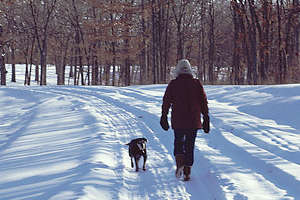
 |
|
 You should keep pets indoors during winter months, and at the very least, outdoor pets must be provided with shelter. The home should be elevated off the ground to prevent moisture accumulation and have a door of some kind to keep out winter winds, sleet, and snow. Shelters should be insulated or heated. Water sources may be heated to permit constant access to unfrozen water. Outdoor pets require extra calories to keep warm. In severely cold or inclement weather, no pet should be kept outside. Indoor pets should have sleeping quarters in a draft-free, warm area with their bed or mattress elevated slightly off the floor. Roaming cats Cats, house pets and wildlife may climb onto vehicle engines for warmth during cold weather. Be sure to check under the hood before starting your vehicle and honk the horn to startle any animals seeking shelter inside. Frostbite and snow removal salt Snow and salt should be removed from pets paws immediately. Frostbitten skin is red or gray. Apply warm, moist towels to thaw out frostbitten areas slowly until the skin appears flushed. Contact your veterinarian as soon as possible for further care. Toxic Plants & Holiday Concerns Plants and other items associated with the winter and holiday season can be toxic to your pets. This is a general guide: Low toxicity: poinsettia leaves/stems; balsam/pine/cedar/fir; angel hair (spun glass); Christmas tree preservatives; snow sprays/snow flock; tree ornaments; super glue; styrofoam; icicles (tinsel); and crayons/paints. Moderate toxicity: fireplace colors/salts; plastic model cement Moderate to high toxicity holly berries and leaves; bubbling lights (methylene chloride); snow scenes (may contain salmonella); aftershaves/perfumes/alcoholic beverages; and chocolate (dark is more toxic than milk). Highly toxic: mistletoe (especially berries); epoxy adhesives; and antifreeze. Please note that some items have special problems. For example, whereas angel hair is usually considered to be of low toxicity, it can irritate eyes, skin, and the gastrointestinal tract; the content of Christmas tree preservatives varies and often effects depend upon the amount ingested; styrofoam, small parts from Christmas tree ornaments and toys, as well as tinsel, can cause mechanical obstructions in the gastrointestinal tract; snow flock can cause problems if sprayed into the mouth and inhaled; and chocolate, of any type, should never be given to a pet. Antifreeze deserves special mention because even a very small amount can be rapidly fatal to pets. Holiday safety for cats Mistletoe and artificial snow are poisonous. Christmas ornament fragments can perforate the stomach. If swallowed, string, ribbon, and tinsel may cause painful intestinal problems. Frayed light cords cause shock or burns. |
|
|